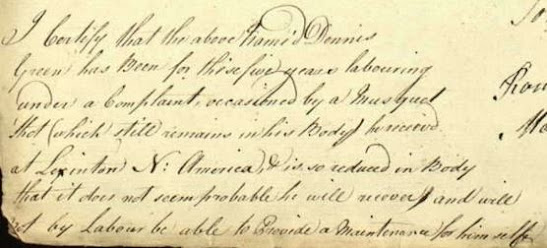The terms of enlistment were very clear to John Bartley: service would be over “at the end of three years, or at the end of said Rebellion, at the option of His Majesty.” These were the terms prescribed by the British War Office for enlistments after December 16, 1775. The British government had committed to using military force to quell a rebellion in thirteen British colonies in North America. This required a significant increase in the size of the army. The established strength of regiments deployed to America was increased by 50 percent, an increase met partly by transferring men from non-deployed regiments and partly by new recruits.
John Bartley was one of those recruits. The five foot nine-and-a-quarter inch tall Scotsman enlisted in the 31st Regiment of Foot in early 1777 at the age of twenty-four. Later that year he was on a transport with other recruits, bound first for Quebec and then going on to the regiment's post at St. Johns on the Richelieu River between Lake Champlain and Montreal.
Bartley served uneventfully enough that no mention of him has been found other than his name on muster rolls throughout the rest of the war. The 31st's grenadier and light infantry companies went on the 1777 campaign towards Albany and were captured at Saratoga that October, remaining in captivity for the rest of the war. In 1781 the regiment selected suitable men from the eight remaining companies to create new grenadier and light infantry companies; Bartley was among those chosen to be a grenadier.
Early in 1783 a peace treaty was signed. The war that had been winding down for months was now officially over. There were now innumerable administrative and logistic tasks involved in reducing the army to a peacetime footing. The 31st Regiment was in Quebec, so it didn't need to go anywhere, but around half of the soldiers were eligible for discharge because of reduced manpower needs. Officers awaited orders for how to proceed with this, but John Bartley decided for himself that his military career was over. In April, probably soon after news of the finalized peace treaty reached Quebec, he refused to do any more duty. As far as he was concerned, he was done.
His officers, not surprisingly, had a different point of view. Bartley was tried by court martial on May 1, found guilty, and sentenced to be punished with 500 lashes. The commander in chief in Quebec reviewed the case and chose to forgive Bartley "in consideration of the Prisoners good character, his confession of having been misled and acted through ignorance." In general orders the commander proclaimed that he hoped Bartley's case would "be a warning and prevent any other soldier from falling into the like error."
Those soldiers awaiting discharge did not have to wait too much longer. Later in the year large numbers of soldiers were discharged, with the option of remaining in North America or returning to Great Britain. Gaps in the muster rolls make John Bartley's fate unknown.

